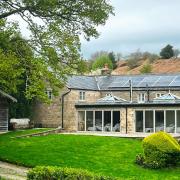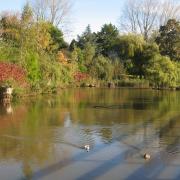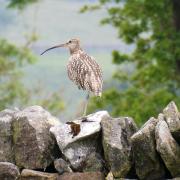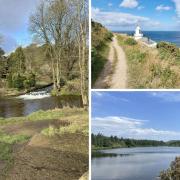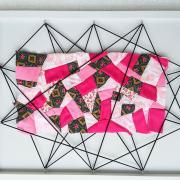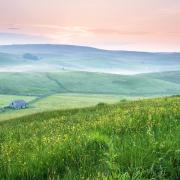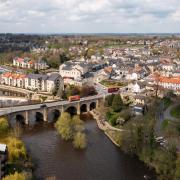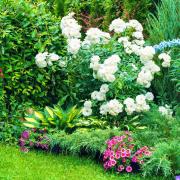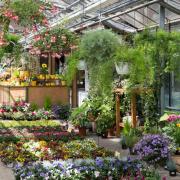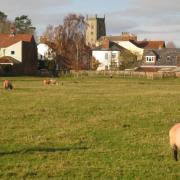Our gardens and outdoor spaces are long-established as our most precious retreats, and have become vital sanctuaries where we can breathe, tend to shoots and seeds, and take notice of our wonderful natural environment.
Large or small, ledge or yard, your garden could also be part of a network of natural havens linking urban green spaces with nature reserves and the countryside. Much-loved garden birds, small mammals like hedgehog,s and moths and small insects that feed rare bats all rely on these green spaces to survive. A worrying 1 in 7 of these species are at risk of extinction, but the way we look after our 24 million gardens can make a big difference to the natural world.
This year, Yorkshire Wildlife Trust is launching #TeamWilder; to work with the rapidly growing movement of people who care about our environment and want to help wildlife thrive. We want 1 in 4 people in Yorkshire to take action for wildlife – over 1.3 million people – and that includes at home in whatever outside space you have.
Our #TeamWilder logo reflects some of our best-loved wildlife – here's how to help this spring...
Plants: Nettles and wildflowers
A wild patch of nettles or a mini-meadow can make a huge difference to your garden biodiversity, even if it’s just squirreled away in a corner or constrained to a pot. Many of our garden butterflies rely on nettles, including painted ladies, red admirals and peacock butterflies.
No-mow May is also growing in popularity; mow a single path through the grass or park the lawnmower entirely and you’ll be amazed at the difference it makes for insects and wild flowers. People have even reported wild orchids appearing for the first time on a lawn left to grow.

Pollinators: butterflies and bees
Grow a good mix of pollinator-friendly and nectar rich plants to attract butterflies and bees, and make sure the range covers from spring to autumn to provide the most food possible. You could also build an insect hotel for solitary bees and other insects – they’re good fun to make and can look quite impressive!
Flying friends: Bats and swifts
Summertime was once heralded by the screech of swifts wheeling overhead, daring acrobatics captivating for any unwitting passers-by. Bats too are a rare treat when out late – but many of these flying friends need our help. Since 1995 the British swift population has dropped by a shocking 53%, and pipistrelle bats declined by 70% between 1978 and 1993.
Install a swift box, bird box or bat box in your garden this spring, or make one if you’re feeling particularly crafty. Both birds and bats will also benefit from a wider range of plants, which bring with them more insects for snacks, and bushes for shelter and nesting.

Frogs
The well-loved frog is a simple soul, but numbers of common frogs are in decline, most likely because there are fewer ponds and pools for them to breed in than there once were. Most gardens have space for a pond – whether that’s a full-blown pond to sit beside and enjoy a croaking chorus, or fashioned from a small container. If you’ve got small children you might want to consider a bog garden instead.
Hedgehogs
Prickly pig, spiny urchin, hedgepig… the UK’s only spiny mammal is easy to spot if you’re lucky enough to find one in your garden. However, all is not well for our well-loved snuffly friend – we’ve lost a third of urban hedgehogs and half of rural hedgehogs since 2000.
Hedgehogs rely on corridors of hedgerows, joined-up gardens or woodlands to roam and feed. Leave a corner of your garden stacked with leaves for a good hibernation spot, and create a small gap in your fence to allow hedgehogs to roam freely between gardens. Hedgehog Highways are becoming an increasingly vital way of keeping our hedgehogs safe and off the roads, and increases access to food, water and shelter.
Go peat-free
Making your own compost at home will reduce plastic from compost bags, but if you’re unable to do so then make sure the compost you buy is peat-free. Request peat free plants at the garden centre too. Peat-based compost will be banned for home gardening in 2024 to help our rich peatland habitat and lock in the carbon – a big contributor to our rapidly changing climate.
Apply for a Wildlife Gardening Award
This March, Yorkshire Wildlife Trust launches a Wildlife Gardening Award to inspire people to do more for wildlife in their gardens. This award will recognise the valuable contribution that gardeners are already making, and encourage keen wildlife gardeners across Yorkshire to share what they are doing.
We want to encourage people from all walks of life to take park so welcome applications from gardens in community spaces, schools, workplaces, care homes… in fact, any type of garden you can think of! To apply, visit ywt.org.uk/Wildlife-Gardening-Award and tell us all about actions you are already taking for wildlife in your garden and receive inspiration for further wild activities you can do to help your local wildlife. You’ll receive a certificate – or for a small donation participants can receive a plaque that can be proudly displayed in their garden.
wildlifetrusts.org/actions. #TeamWilder ywt.org.uk/team-wilder.




